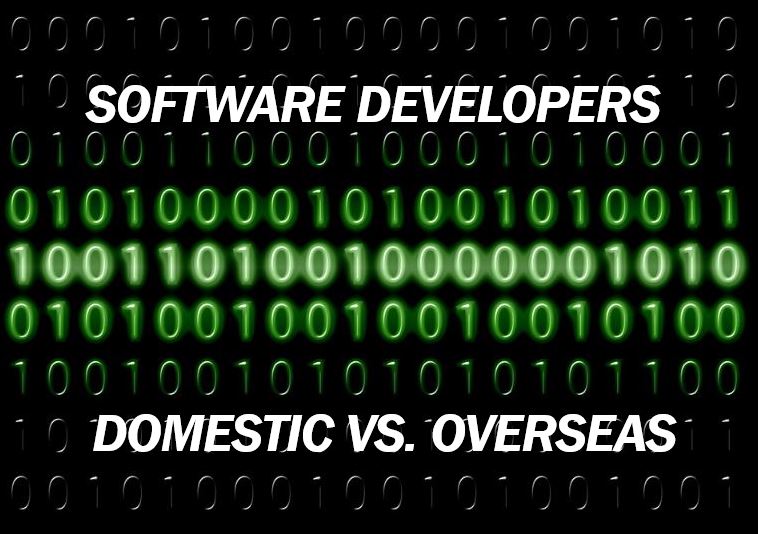 Many modern businesses require access to software developers, whether it’s to customize a platform they use for management or organization, or to build an app to sell to potential customers. There are many hiring options available, including hiring full-time software developers on your staff, outsourcing your development to another country, working with an agency, or using domestic freelancers. Obviously, your business will want to balance cost with quality, opting for the highest possible quality of software development for the lowest costs.
Many modern businesses require access to software developers, whether it’s to customize a platform they use for management or organization, or to build an app to sell to potential customers. There are many hiring options available, including hiring full-time software developers on your staff, outsourcing your development to another country, working with an agency, or using domestic freelancers. Obviously, your business will want to balance cost with quality, opting for the highest possible quality of software development for the lowest costs.
Today, entrepreneurs and founders are heavily gravitating toward overseas software developers; they tend to be cheaper, in some cases faster, and thanks to the internet, they’re fairly easy to find. But you might be surprised to learn that most overseas developers simply aren’t worth the hassle.
The Disadvantages of Overseas Software Development
The advantages of overseas software developers are fairly straightforward; they tend to be cheaper than their domestic counterparts. But think about these disadvantages:
- Language barriers. Most overseas software development firms and groups have at least one prominent employee who can speak English fluently, so they can communicate with you on a regular basis. However, this isn’t always the case. Even if your overseas team speaks English, it’s unlikely that they’re native speakers, and may have trouble understanding your specs, parsing your requests, or understanding your basic turns of phrase. Most likely, the majority of your developers will have a very limited understanding of English, which can make it difficult to describe any issues you face or make requests.
- Time zone discrepancies. Depending on where you outsource your software development, you’ll likely run into some time zone discrepancies. For example, if you hire a team of software developers in India, which is practically on the other side of the world, there will be little overlap between your typical 9 to 5 hours. Your India team may make accommodations for this, working during the night so they can communicate with you during your typical business hours, but this isn’t a guarantee, and you may not have access to the full team this way. You may also be forced to work extra hours to make up the difference.
- Currency exchanges (and extra costs). Paying an international employee or agency can be problematic as well. You’ll typically need to pay those employees in their own national currency, which means paying a fee to exchange your currency for theirs. There may also be legal or regulatory restrictions on how much you can transfer, when you can transfer, or which accounts you can use to transfer, all of which can be a headache.
- Lack of face-to-face collaboration. Face-to-face communication isn’t a strict necessity for quality software development, but it certainly helps. You may be able to video chat with some of your software developers, but you won’t be able to collaborate with them in real-time the way you would if you all worked in an office together, or if you were working with an agency in close physical proximity to your offices.
- Legal differences. Different countries have different laws relating to labor, payments, and even copyright restrictions. This can hurt you in a variety of different ways, since it practically doubles your potential legal liabilities. If you aren’t careful, you could be accused of unfair labor practices, or accidentally violate some obscure international law you didn’t know existed. If copyright laws are lax in your development country of choice, you could also run the risk of having your software ideas stolen and used in a different context. Working with a lawyer who specializes in international law can help you mitigate these risks, but this poses an additional cost that may negate some of the savings you’d otherwise receive.
- Lack of transparency. Some overseas developers will intentionally try to be as transparent as possible, but this is far from a guarantee. It’s more likely that you won’t fully understand how the agency operates, how these developers are working, or what other clients they might have.
- Scam potential. In many ways, it’s easier to pull off a scam while posing as an overseas developer than it is while posing as a domestic one. You’ll have access to less information, fewer ways of seeking justice, and more complex difficulties navigating your different legal systems. While not all overseas developers are scammers (not by a long shot), the risk is undeniably higher.
Improving the Budget
If the software is worth developing, it’s worth developing at the highest possible quality—and in a way that doesn’t burden your organization with inconveniences like communication barriers. You may have to pay a little more for an in-house software developer or development agency that knows what they’re doing, but it’s almost always worth the extra investment.

